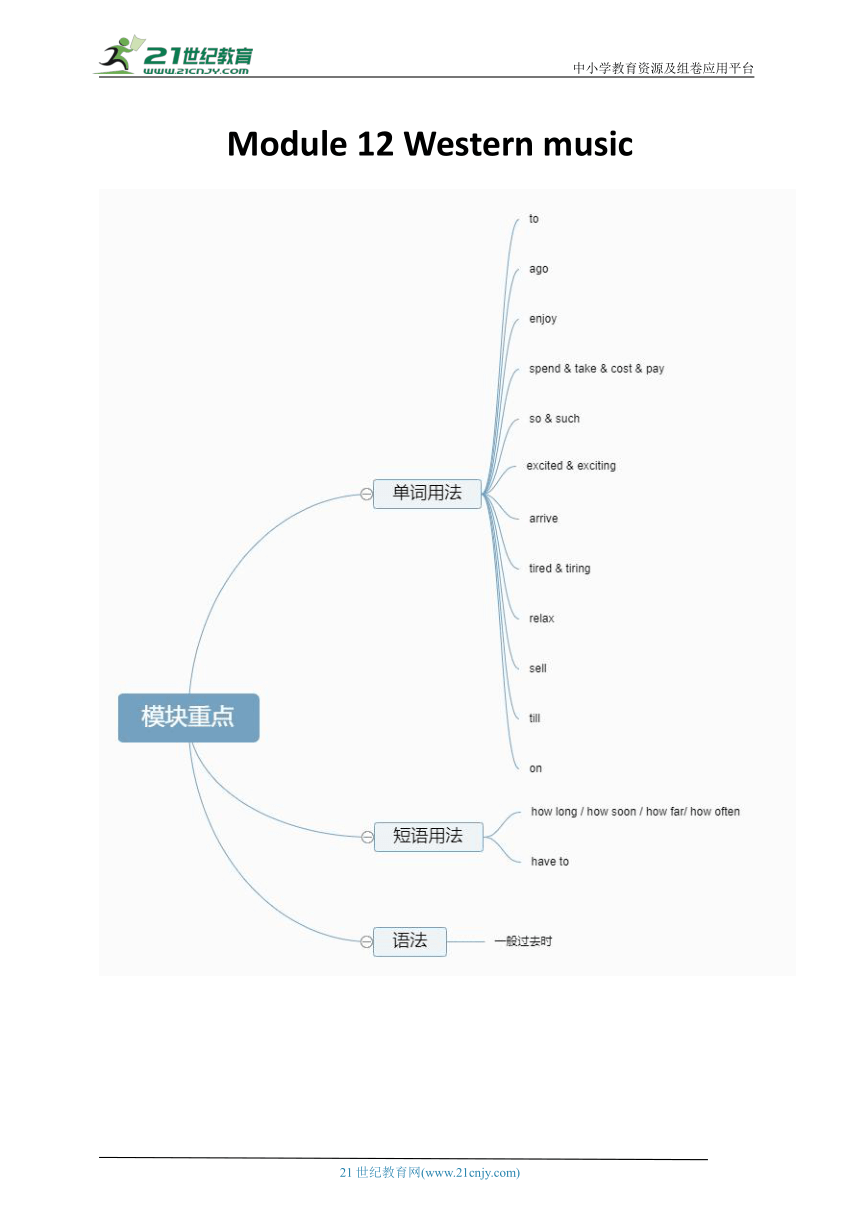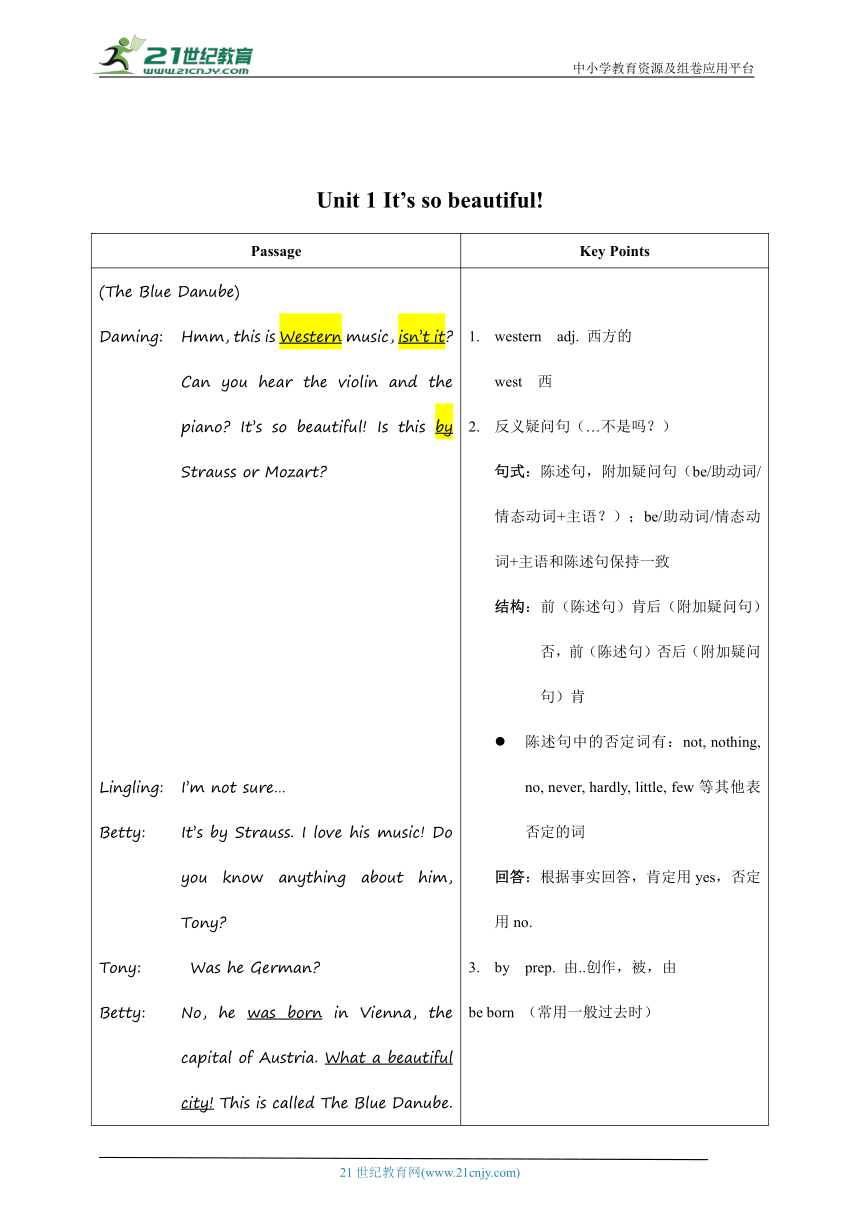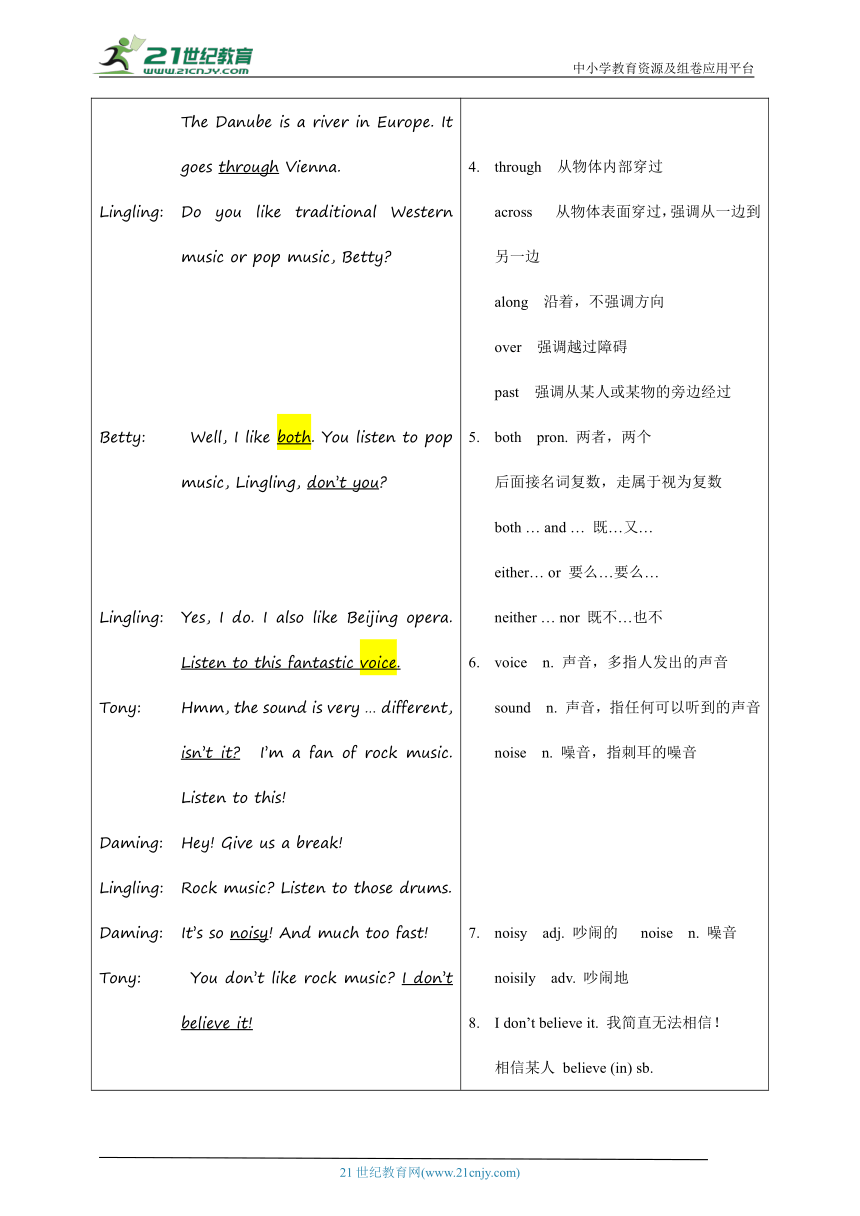(外研版)七年级下册 Module 12 Western music 讲义
文档属性
| 名称 | (外研版)七年级下册 Module 12 Western music 讲义 |

|
|
| 格式 | doc | ||
| 文件大小 | 220.6KB | ||
| 资源类型 | 试卷 | ||
| 版本资源 | 外研版 | ||
| 科目 | 英语 | ||
| 更新时间 | 2022-06-29 00:00:00 | ||
图片预览



文档简介
中小学教育资源及组卷应用平台
Module 12 Western music
Unit 1 It’s so beautiful!
Passage Key Points
(The Blue Danube)Daming: Hmm, this is Western music, isn’t it Can you hear the violin and the piano It’s so beautiful! Is this by Strauss or Mozart Lingling: I’m not sure…Betty: It’s by Strauss. I love his music! Do you know anything about him, Tony Tony: Was he German Betty: No, he was born in Vienna, the capital of Austria. What a beautiful city! This is called The Blue Danube. The Danube is a river in Europe. It goes through Vienna.Lingling: Do you like traditional Western music or pop music, Betty Betty: Well, I like both. You listen to pop music, Lingling, don’t you Lingling: Yes, I do. I also like Beijing opera. Listen to this fantastic voice.Tony: Hmm, the sound is very … different, isn’t it I’m a fan of rock music. Listen to this!Daming: Hey! Give us a break!Lingling: Rock music Listen to those drums.Daming: It’s so noisy! And much too fast!Tony: You don’t like rock music I don’t believe it! western adj. 西方的 west 西反义疑问句(…不是吗?)句式:陈述句,附加疑问句(be/助动词/情态动词+主语?);be/助动词/情态动词+主语和陈述句保持一致结构:前(陈述句)肯后(附加疑问句)否,前(陈述句)否后(附加疑问句)肯陈述句中的否定词有:not, nothing, no, never, hardly, little, few等其他表否定的词回答:根据事实回答,肯定用yes,否定用no.by prep. 由..创作,被,由be born (常用一般过去时)through 从物体内部穿过across 从物体表面穿过,强调从一边到另一边along 沿着,不强调方向over 强调越过障碍past 强调从某人或某物的旁边经过both pron. 两者,两个后面接名词复数,走属于视为复数both … and … 既…又…either… or 要么…要么…neither … nor 既不…也不voice n. 声音,多指人发出的声音sound n. 声音,指任何可以听到的声音noise n. 噪音,指刺耳的噪音noisy adj. 吵闹的 noise n. 噪音noisily adv. 吵闹地I don’t believe it. 我简直无法相信!相信某人 believe (in) sb.
Unit 2 Vienna is the centre of European classical music
Passage Key Points
The city of musicVienna is a beautiful old city on the River Danube in the centre of Europe. It’s the capital city of Austria and the centre of European classical music. In the eighteenth century a lot of musicians came to study and work in Vienna.In the Strauss family, there were two composers called Johann Strauss: the father and the son. The father, Johann Strauss the elder, wrote and played music for traditional dances, called the waltz. His dance music made him famous all over Europe. The son, Johann Strauss the younger, was also very successful and popular. He wrote over 150 waltzes. In 1867 he wrote The Blue Danube waltz.Mozart was another very important composer. He was born in Austria in 1756. Before he was six, he played not only the piano but also the violin. His family took him around Europe and he gave concerts in many cities. He wrote hundreds of wonderful pieces of music. But he became very poor and died in 1791 when he was only thirty-five. Like Johann Strauss, father and son, he was a great European musician, and many people still think his music is perfect. centre n. 中心,指物体的正中心in the centre of 在…的中心middle n. 中间,指中间或中部in the middle of 在…中间在…世纪in the + 序数词 + centurymusician n. 音乐家 music n. 音乐 musical adj. 音乐的called 名叫…的elder 年长的;一般修饰人,不可与than连用older 较老的,较旧的;修饰人或物,可与than 连用make + sb. /sth. + n./v./adj.another pron. 另一个(三者及以上之外的另一个)做主语视为单数not only … but also …不仅…而且…做主语满足就近原则take sb. around 带某人参观 = show sb. around
Unit 3 Language Use
--感叹句和选择疑问句
感叹句:
陈述句!
What (a/an) + adj. + n.!
How + adj./adv. +(主语+谓语)!
区分:what 姓名反之how, what a/an 注意到
_________ interesting story it is!
_________ beautiful flowers they are!
_________ kind the girl is !
_________ time flies!
选择疑问句:一般疑问句+or+另一个选择成分?
--Do you like pop music or classical music –Pop music.
回答:根据实际情况回答/both/either
根据实际情况回答
21世纪教育网 www.21cnjy.com 精品试卷·第 2 页 (共 2 页)
HYPERLINK "http://21世纪教育网(www.21cnjy.com)
" 21世纪教育网(www.21cnjy.com)
Module 12 Western music
Unit 1 It’s so beautiful!
Passage Key Points
(The Blue Danube)Daming: Hmm, this is Western music, isn’t it Can you hear the violin and the piano It’s so beautiful! Is this by Strauss or Mozart Lingling: I’m not sure…Betty: It’s by Strauss. I love his music! Do you know anything about him, Tony Tony: Was he German Betty: No, he was born in Vienna, the capital of Austria. What a beautiful city! This is called The Blue Danube. The Danube is a river in Europe. It goes through Vienna.Lingling: Do you like traditional Western music or pop music, Betty Betty: Well, I like both. You listen to pop music, Lingling, don’t you Lingling: Yes, I do. I also like Beijing opera. Listen to this fantastic voice.Tony: Hmm, the sound is very … different, isn’t it I’m a fan of rock music. Listen to this!Daming: Hey! Give us a break!Lingling: Rock music Listen to those drums.Daming: It’s so noisy! And much too fast!Tony: You don’t like rock music I don’t believe it! western adj. 西方的 west 西反义疑问句(…不是吗?)句式:陈述句,附加疑问句(be/助动词/情态动词+主语?);be/助动词/情态动词+主语和陈述句保持一致结构:前(陈述句)肯后(附加疑问句)否,前(陈述句)否后(附加疑问句)肯陈述句中的否定词有:not, nothing, no, never, hardly, little, few等其他表否定的词回答:根据事实回答,肯定用yes,否定用no.by prep. 由..创作,被,由be born (常用一般过去时)through 从物体内部穿过across 从物体表面穿过,强调从一边到另一边along 沿着,不强调方向over 强调越过障碍past 强调从某人或某物的旁边经过both pron. 两者,两个后面接名词复数,走属于视为复数both … and … 既…又…either… or 要么…要么…neither … nor 既不…也不voice n. 声音,多指人发出的声音sound n. 声音,指任何可以听到的声音noise n. 噪音,指刺耳的噪音noisy adj. 吵闹的 noise n. 噪音noisily adv. 吵闹地I don’t believe it. 我简直无法相信!相信某人 believe (in) sb.
Unit 2 Vienna is the centre of European classical music
Passage Key Points
The city of musicVienna is a beautiful old city on the River Danube in the centre of Europe. It’s the capital city of Austria and the centre of European classical music. In the eighteenth century a lot of musicians came to study and work in Vienna.In the Strauss family, there were two composers called Johann Strauss: the father and the son. The father, Johann Strauss the elder, wrote and played music for traditional dances, called the waltz. His dance music made him famous all over Europe. The son, Johann Strauss the younger, was also very successful and popular. He wrote over 150 waltzes. In 1867 he wrote The Blue Danube waltz.Mozart was another very important composer. He was born in Austria in 1756. Before he was six, he played not only the piano but also the violin. His family took him around Europe and he gave concerts in many cities. He wrote hundreds of wonderful pieces of music. But he became very poor and died in 1791 when he was only thirty-five. Like Johann Strauss, father and son, he was a great European musician, and many people still think his music is perfect. centre n. 中心,指物体的正中心in the centre of 在…的中心middle n. 中间,指中间或中部in the middle of 在…中间在…世纪in the + 序数词 + centurymusician n. 音乐家 music n. 音乐 musical adj. 音乐的called 名叫…的elder 年长的;一般修饰人,不可与than连用older 较老的,较旧的;修饰人或物,可与than 连用make + sb. /sth. + n./v./adj.another pron. 另一个(三者及以上之外的另一个)做主语视为单数not only … but also …不仅…而且…做主语满足就近原则take sb. around 带某人参观 = show sb. around
Unit 3 Language Use
--感叹句和选择疑问句
感叹句:
陈述句!
What (a/an) + adj. + n.!
How + adj./adv. +(主语+谓语)!
区分:what 姓名反之how, what a/an 注意到
_________ interesting story it is!
_________ beautiful flowers they are!
_________ kind the girl is !
_________ time flies!
选择疑问句:一般疑问句+or+另一个选择成分?
--Do you like pop music or classical music –Pop music.
回答:根据实际情况回答/both/either
根据实际情况回答
21世纪教育网 www.21cnjy.com 精品试卷·第 2 页 (共 2 页)
HYPERLINK "http://21世纪教育网(www.21cnjy.com)
" 21世纪教育网(www.21cnjy.com)
同课章节目录
- Module 1 Lost and found
- Unit 1 Whose bag is this?
- Unit 2 Are they yours?
- Unit 3 Language in use
- Module 2 What can you do ?
- Unit 1 I can play the piano
- Unit 2 I can run really fast
- Unit 3 Language in use
- Module 3 Making plans
- Unit 1 What are you going to do at the weekends?
- Unit 2 We're going to cheer the players.
- Unit 3 Language in use
- Module 4 Life in the future
- Unit 1 Everyone will study at home
- Unit 2 Every family will have a small plane.
- Unit 3 Language in use
- Module 5 Shopping
- Unit 1 What can I do for you?
- Unit 2 You can buy everything on the Internet
- Unit 3 Language in use
- Module 6 Around town
- Unit 1 Could you tell me how to get to the Nationa
- Unit 2 The London Eye is on your right.
- Unit 3 Language in use
- Revision module A
- Module 7 My past life
- Unit 1 I was born in a small village.
- Unit 2 I was born in Quincy.
- Unit 3 Language in use
- Module 8 Story time
- Unit 1 Once upon a time….
- Unit 2 Goldilocks hurried out of the house.
- Unit 3 Language in use
- Module 9 Life history
- Unit 1 He left school and began work at the age of
- Unit 2 He decided to be an actor.
- Unit 3 Language in use
- Module 10 A holiday journey
- Unit 1 What did you do?
- Unit 2 This morning we took a walk.
- Unit 3 Language in use
- Module 11 Body language
- Unit 1 They touch noses!
- Unit 2 Here are some ways to welcome them.
- Unit 3 Language in use
- Module 12 Western music
- Unit 1 It's so beautiful!
- Unit 2 Vienna is the centre of European classical
- Unit 3 Language in use
- Revision module B
